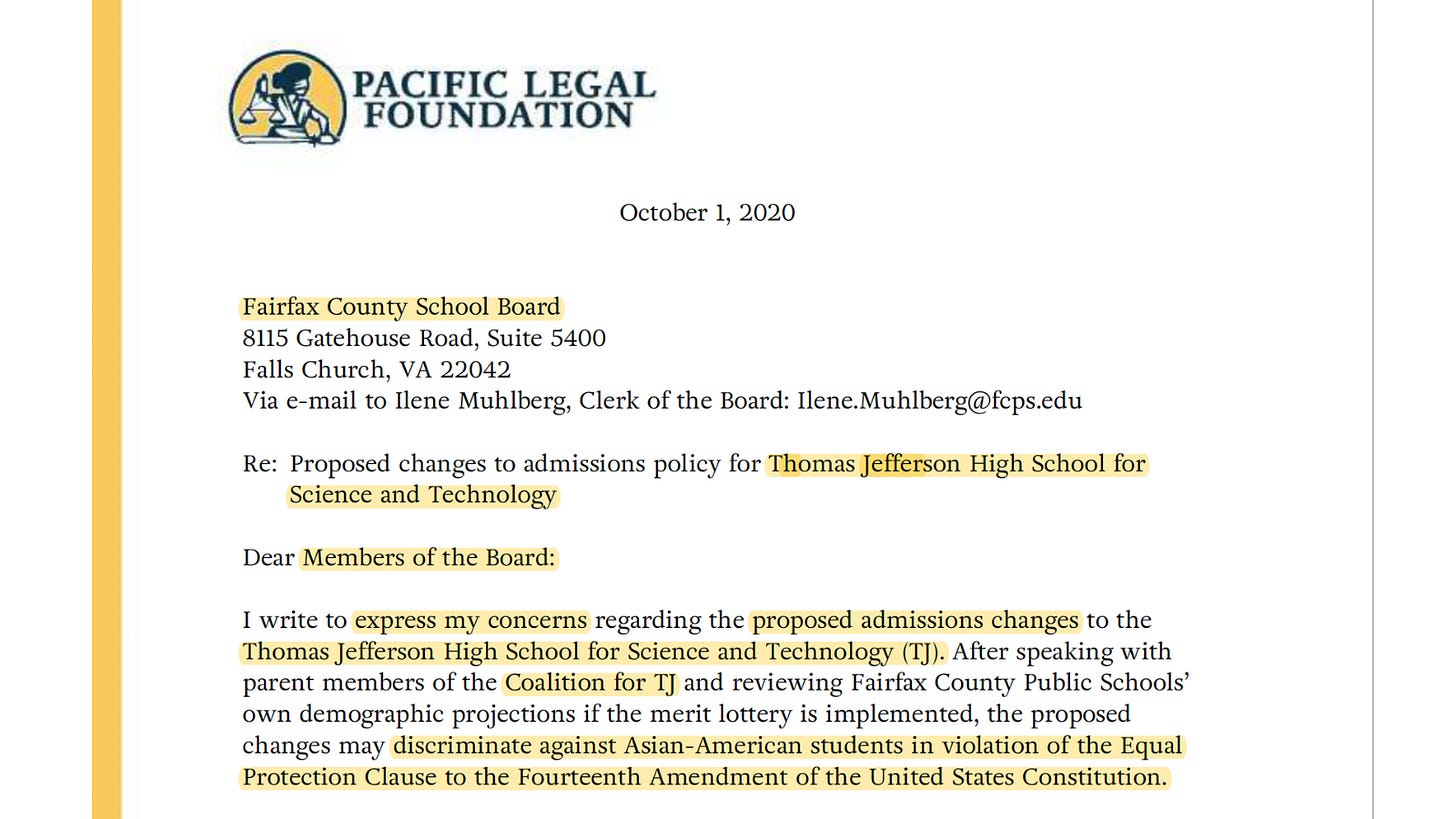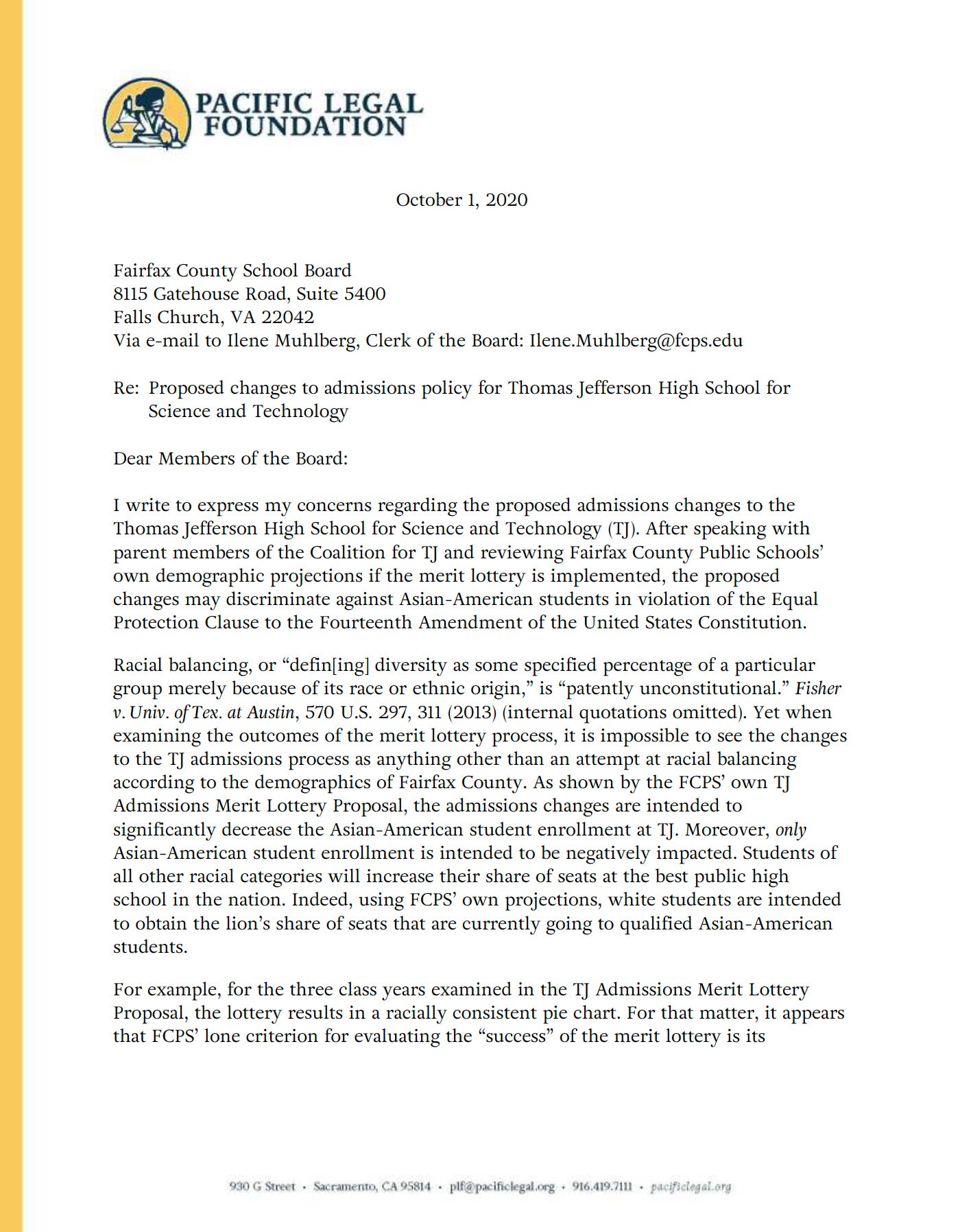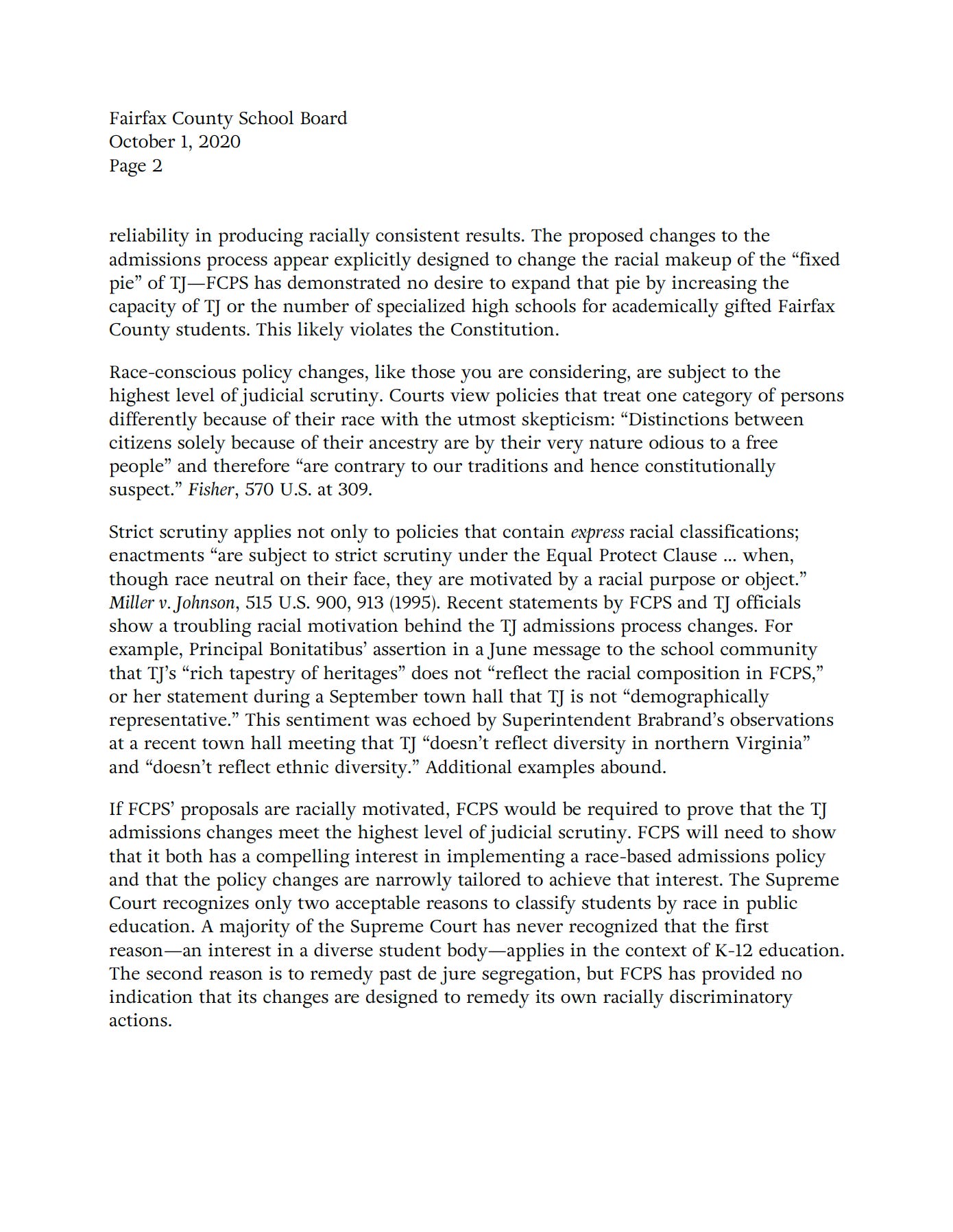Breaking: Pacific Legal Warns Virginia School Board It's Being Anti-Asian
Powerful letter says lottery plan for No. 1 high school runs afoul of U.S. Constitution
By Asra Q. Nomani
FAIRFAX COUNTY, Va. — Pacific Legal Foundation, a nonprofit championing the rights of students and families from New York City to Montgomery County, Md., just dispatched a strong letter to the Fairfax County Schools Board, with an incredibly important warning: watch out, you’re violating the U.S. Constitution.
The letter by Pacific Legal Foundation attorney Erin E. Wilcox, reprinted in its entirety below and viewable at this link, is powerful for its eloquence and clarity in how the school system is targeting Asian-American students in a controversial new admissions plan for Thomas Jefferson High School for Science and Technology that will likely “discriminate against Asian-American students, in violation of the Equal Protection Clause to the Fourteenth Amendment of the United States Constitution.”
Ironically, for a plan presented with the cover of increasing “diversity,” Wilcox notes that white students will receive the “lion share” of new slots at TJ.

Some highlights in the argument:
“After speaking with parent members of the Coalition for TJ and reviewing Fairfax County Public Schools’ own demographic projections if the merit lottery is implemented, the proposed changes may discriminate against Asian-American students in violation of the Equal Protection Clause to the Fourteenth Amendment of the United States Constitution.”
“The proposed changes to the admissions process appear explicitly designed to change the racial makeup of the ‘fixed pie’ of TJ—FCPS has demonstrated no desire to expand that pie by increasing the capacity of TJ or the number of specialized high schools for academically gifted Fairfax County students. This likely violates the Constitution.”
“There is no evidence that the proposed race-conscious changes to TJ’s admissions process were a last resort, or even a second-to-last resort. Race appears to be at the forefront of all discussions.”
Parents responded to the legal rebuke of a school superintendent, Scott Brabrand, and school board with joy, as school system careens to an October 8 school board meeting to finalize a very flawed proposal created in an extremely polarizing anti-Asian climate set by Brabrand and school board members, that has moved the war over merit from the cities to the suburbs.
“Perfect timing!” a parent said.

In a triumph for families, exhausted by the assault from school officials, Wilcox wrote, “TJ is a multicultural, multiracial school that proves hard work can lead to exceptional opportunities. Among its Asian-American community, which FCPS treats as the monolithic ‘Asian’ in its proposal, are students whose immigrant families hail from India, China, South Korea, Vietnam, Japan, and other distinctive nations. These are nations with unique cultures, unique perspectives, and even unique languages. How individuals with such varied backgrounds could be considered ‘un-diverse’ and lumped together into a stereotypical ‘Asian’ category is deeply troubling. Yet under the proposed changes to the TJ admissions plan, FCPS intends to eliminate at least 20% of the seats held by these ‘Asian’ individuals.”
She stated that the school board and superintendent, Scott Brabrand, are running up against ideas established as unconstitutional, including “racial balancing” and “race-conscious policy changes” that lead to one clear outcome: a decimation of the school’s Asian-American majority population, which currently makes up about 73 percent of the school’s student body.
She concluded, “The Board should be working to eliminate racial barriers and racial stereotypes, not reinforce them. That is the promise of the Equal Protection Clause. I urge the Board to strongly consider the constitutional implications of its proposed changes prior to implementing them.”
Read the letter. It’s a must read if you care about protecting the American Dream, the idea of meritocracy and the belief in protecting all students from attack and discrimination.
Asra Q. Nomani is a former Wall Street Journal reporter and the parent of a student at Thomas Jefferson High School for Science and Technology. She can be reached at asra@asranomani.com.
Warning Letter to the Fairfax County School Board
October 1, 2020
Fairfax County School Board 8115 Gatehouse Road, Suite 5400 Falls Church, VA 22042
Via e-mail to Ilene Muhlberg, Clerk of the Board: Ilene.Muhlberg@fcps.edu
Re: Proposed changes to admissions policy for Thomas Jefferson High School for Science and Technology
Dear Members of the Board:
I write to express my concerns regarding the proposed admissions changes to the Thomas Jefferson High School for Science and Technology (TJ). After speaking with parent members of the Coalition for TJ and reviewing Fairfax County Public Schools’ own demographic projections if the merit lottery is implemented, the proposed changes may discriminate against Asian-American students in violation of the Equal Protection Clause to the Fourteenth Amendment of the United States Constitution.
Racial balancing, or “defin[ing] diversity as some specified percentage of a particular group merely because of its race or ethnic origin,” is “patently unconstitutional.” Fisher v. Univ. of Tex. at Austin, 570 U.S. 297, 311 (2013) (internal quotations omitted). Yet when examining the outcomes of the merit lottery process, it is impossible to see the changes to the TJ admissions process as anything other than an attempt at racial balancing according to the demographics of Fairfax County. As shown by the FCPS’ own TJ Admissions Merit Lottery Proposal, the admissions changes are intended to significantly decrease the Asian-American student enrollment at TJ. Moreover, only Asian-American student enrollment is intended to be negatively impacted. Students of all other racial categories will increase their share of seats at the best public high school in the nation. Indeed, using FCPS’ own projections, white students are intended to obtain the lion’s share of seats that are currently going to qualified Asian-American students.
For example, for the three class years examined in the TJ Admissions Merit Lottery Proposal, the lottery results in a racially consistent pie chart. For that matter, it appears that FCPS’ lone criterion for evaluating the “success” of the merit lottery is its reliability in producing racially consistent results. The proposed changes to the admissions process appear explicitly designed to change the racial makeup of the “fixed pie” of TJ—FCPS has demonstrated no desire to expand that pie by increasing the capacity of TJ or the number of specialized high schools for academically gifted Fairfax County students. This likely violates the Constitution.
Race-conscious policy changes, like those you are considering, are subject to the highest level of judicial scrutiny. Courts view policies that treat one category of persons differently because of their race with the utmost skepticism: “Distinctions between citizens solely because of their ancestry are by their very nature odious to a free people” and therefore “are contrary to our traditions and hence constitutionally suspect.” Fisher, 570 U.S. at 309.
Strict scrutiny applies not only to policies that contain express racial classifications; enactments “are subject to strict scrutiny under the Equal Protect Clause ... when, though race neutral on their face, they are motivated by a racial purpose or object.” Miller v. Johnson, 515 U.S. 900, 913 (1995). Recent statements by FCPS and TJ officials show a troubling racial motivation behind the TJ admissions process changes. For example, Principal Bonitatibus’ assertion in a June message to the school community that TJ’s “rich tapestry of heritages” does not “reflect the racial composition in FCPS,” or her statement during a September town hall that TJ is not “demographically representative.” This sentiment was echoed by Superintendent Brabrand’s observations at a recent town hall meeting that TJ “doesn’t reflect diversity in northern Virginia” and “doesn’t reflect ethnic diversity.” Additional examples abound.
If FCPS’ proposals are racially motivated, FCPS would be required to prove that the TJ admissions changes meet the highest level of judicial scrutiny. FCPS will need to show that it both has a compelling interest in implementing a race-based admissions policy and that the policy changes are narrowly tailored to achieve that interest. The Supreme Court recognizes only two acceptable reasons to classify students by race in public education. A majority of the Supreme Court has never recognized that the first reason—an interest in a diverse student body—applies in the context of K-12 education. The second reason is to remedy past de jure segregation, but FCPS has provided no indication that its changes are designed to remedy its own racially discriminatory actions.
Further, the TJ admissions changes are not likely to be narrowly tailored. To pass this hurdle, a court “must be ultimately satisfied that no workable race-neutral alternatives” would suffice. Fisher, 570 U.S. at 312. The plan must be a “last resort.” Parents Involved in Community Schools v. Seattle School Dist. No. 1, 551 U.S. 701, 790(2007) (Kennedy, J., concurring). There is no evidence that the proposed race-conscious changes to TJ’s admissions process were a last resort, or even a second-to-last resort. Race appears to be at the forefront of all discussions. Opportunity-enhancing alternatives like creating additional STEM high schools or providing greater access to test prep without imposing regional pathways are just two examples of alternatives that may address concerns over TJ’s enrollment without unconstitutionally singling out Asian-American students because of their race.
TJ is a multicultural, multiracial school that proves hard work can lead to exceptional opportunities. Among its Asian-American community, which FCPS treats as the monolithic “Asian” in its proposal, are students whose immigrant families hail from India, China, South Korea, Vietnam, Japan, and other distinctive nations. These are nations with unique cultures, unique perspectives, and even unique languages. How individuals with such varied backgrounds could be considered “un-diverse” and lumped together into a stereotypical “Asian” category is deeply troubling. Yet under the proposed changes to the TJ admissions plan, FCPS intends to eliminate at least 20% of the seats held by these “Asian” individuals.
The Board should be working to eliminate racial barriers and racial stereotypes, not reinforce them. That is the promise of the Equal Protection Clause. I urge the Board to strongly consider the constitutional implications of its proposed changes prior to implementing them.
Sincerely,

Erin E. Wilcox
Attorney, Pacific Legal Foundation
*Admitted to practice in NC and DC





